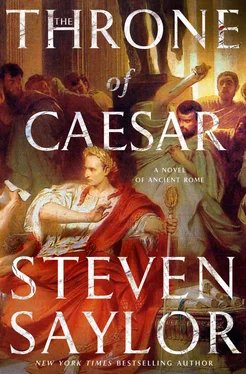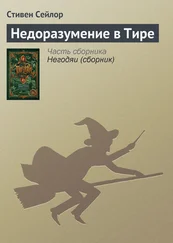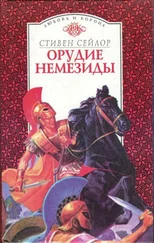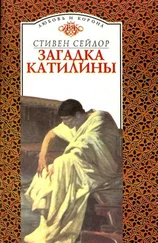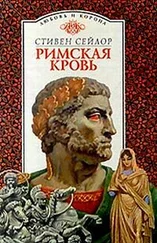Стивен Сейлор - The Throne of Caesar
Здесь есть возможность читать онлайн «Стивен Сейлор - The Throne of Caesar» весь текст электронной книги совершенно бесплатно (целиком полную версию без сокращений). В некоторых случаях можно слушать аудио, скачать через торрент в формате fb2 и присутствует краткое содержание. Год выпуска: 2018, Издательство: St. Martin's Press, Жанр: Исторический детектив, на английском языке. Описание произведения, (предисловие) а так же отзывы посетителей доступны на портале библиотеки ЛибКат.
- Название:The Throne of Caesar
- Автор:
- Издательство:St. Martin's Press
- Жанр:
- Год:2018
- ISBN:нет данных
- Рейтинг книги:5 / 5. Голосов: 1
-
Избранное:Добавить в избранное
- Отзывы:
-
Ваша оценка:
- 100
- 1
- 2
- 3
- 4
- 5
The Throne of Caesar: краткое содержание, описание и аннотация
Предлагаем к чтению аннотацию, описание, краткое содержание или предисловие (зависит от того, что написал сам автор книги «The Throne of Caesar»). Если вы не нашли необходимую информацию о книге — напишите в комментариях, мы постараемся отыскать её.
The Throne of Caesar — читать онлайн бесплатно полную книгу (весь текст) целиком
Ниже представлен текст книги, разбитый по страницам. Система сохранения места последней прочитанной страницы, позволяет с удобством читать онлайн бесплатно книгу «The Throne of Caesar», без необходимости каждый раз заново искать на чём Вы остановились. Поставьте закладку, и сможете в любой момент перейти на страницу, на которой закончили чтение.
Интервал:
Закладка:
“Yet I didn’t see her among the grieving women with Calpurnia. I didn’t see her at all.”
“No? Well, I hardly saw her that day myself. We were both very busy.”
“I was most certainly present at the funeral of Caesar,” said Fulvia, who seemed to have appeared from nowhere, as if my words had conjured her. Antony seemed as startled as I was. He frowned for a moment, then gave her a crooked grin.
“Well, Senator Gordianus,” he said, “have I assured you of your status? Was that the business you had with me this morning?”
“No. Actually, it was the consul’s wife I came to see.”
“Oh, yes?” He gave me a quizzical look. “Well, here she is. Are you receiving visitors, wife?”
“No.” Like Antony, Fulvia was dressed in a sleeping gown that immodestly left her arms uncovered. “But I’ll make an exception for the Finder.”
“We must call him ‘Senator’ now, my love.”
She slowly nodded. She studied my face, and frowned. “Is this a delicate matter, Senator?”
I took a deep breath. “Very much so.”
“Husband, would you…?”
Antony took his wife’s unspoken hint and stepped toward the door. Was he always so obliging to her wishes?
“And Antony, do take off that hideous thing. The fewer people who see it, the better. ”
Antony lifted the silver pectoral over his head with a sigh as he stepped out of the room, leaving us alone.
Fulvia looked at me steadily, not saying a word, forcing me to speak first.
“When Caesar died…” I said quietly. “When I saw him killed before my eyes, it was a horrible thing. A terrible shock. Almost … unthinkable. And yet … who among us was truly surprised? Only a few days have passed, yet now it seems almost as if his death was preordained. Inevitable. Certainly understandable. And then, I saw Cinna die.…”
“Did you actually see it happen?” she said sharply.
“Not exactly. I was struck on the head, twice. As I told you the other day.”
She nodded.
“However jumbled my senses, what I witnessed that day was even more horrible than what I saw when Caesar died. Cinna was quite literally ripped apart, his head and his limbs torn from his body. Killed as Orpheus was killed, and Pentheus. But why? People say he was mistaken for the other Cinna. Ripped to pieces by mistake! Killed for no reason, his body defiled, his head displayed on a pole. It was incomprehensible. Caesar’s death at least made sense. But to be so gruesomely murdered by mistake—except, of course, that it wasn’t a mistake. Cinna was deliberately killed. There was a reason.”
Fulvia stared at me, her eyes fixed on mine. At last she spoke. “Father Liber commanded it.”
“No, Fulvia. You commanded it.”
“As a priestess of Father Liber, yes.”
For a long moment I was speechless. I hadn’t really expected her to admit her guilt. Now that she had, I hesitated to pursue the questions in my head, dreading the answers. “Whom did you command? And why? And what did you do with Cinna’s body?”
Fulvia crossed her arms and raised her chin, looking as formidable as any man, so imposing that I took a step backward.
“Which question should I answer first?” she said quietly. “I really shouldn’t tell you who was involved. Now that you’re a senator, you might actually be able to make trouble for us. But I think you won’t, once you know the truth. Very well, then. Do you remember the women who attended the funeral yesterday?”
“I saw them. I didn’t recognize them.”
“Good. Because those women were the vessels for the divine wrath that destroyed Cinna.”
“Women? You’re telling me it was women who tore Cinna limb from limb? That’s not possible.”
“No? You think that mere, weak women could never be strong enough? Clearly, Gordianus, you do not comprehend the Bacchic frenzy. Inspired by Dionysus, Father Liber, Bacchus—the god of countless names—and with just a touch of witchcraft, even mere women can exceed your wildest imaginings.”
“Witchcraft?” I drew a sharp breath.
“There is a point at which a mortal woman can become a Maenad—not merely like a Maenad—a moment of metamorphosis. Certain spells must be cast. Polyxo is a very skillful witch.”
“The Nubian nursemaid? Are you telling me Polyxo can transform mortal women into Maenads?”
“With the god’s help. Maenads. Bacchantes. Vessels of the righteous anger of Dionysus. Daughters of Father Liber.”
“I had thought … I dreamed … of the Furies—”
“It had nothing to do with the Furies!” Her eyes flashed. “Only Dionysus.”
“But you were there to lead them. It was your voice I heard, wasn’t it? Cinna heard it, too—a voice that called out his name, pointing him out to the others. A gruff, husky voice … like raw silk upon the ear…”
“Like this, you mean? ‘Cinna! Look, there he is! There is Cinna!’” She reproduced the voice exactly as I had heard it that day. Hackles rose on the back of my neck. The voice seemed to come from somewhere outside her body. The effect was uncanny.
I was taken back to that moment: I heard the roar of the crowd, saw Cinna smiling beside me, smelled the first hint of myrrh. “Cinna thought he had been recognized by some lover of his poetry, excited by the sight of him.”
“Lover of his poetry? Hardly that!” Her laughter was harsh and cruel.
“Sappho—was she among the women?”
“No. From the beginning, it was decided that she should not be present or take part. There was to be no blood on her hands.”
“But she knew, beforehand?”
“Yes, of course. It was done for her sake.”
“And yet, she tried to warn her father.…”
“Yes, in a moment of doubt, of weakness, Sappho wrote that word in the sand. Poor, sad thing. Was the word a warning or a threat? Did she intend to save her father, or cause him dread? Whatever she was thinking, when I heard about it from Polyxo I told her to stop. I wasn’t about to see Cinna wriggle out of his punishment, now that the moment had finally come.”
I shook my head. The word “beware” in Greek had been used to warn Cinna. The same word had been used by Artemidorus, in the note I had passed into Caesar’s hand. Neither warning had been heeded. And they had nothing to do with each other.
“The moment had come, you say. Why that moment? Why that day for Cinna’s death?”
“We bided our time, thinking to do it after Caesar left for Parthia. With Antony running the city, I’d have a free hand. But then I learned that Caesar intended that Cinna would go with him, so it had to be done quickly, before they departed—”
“Just as Caesar’s killers had to act by the Ides of March,” I said.
“Yes. First I chose the Liberalia, knowing that the power of Father Liber and the witchcraft of Polyxo would be particularly potent that day.”
“Polyxo!” I said, struck by the bitter irony of her name. The Polyxo of legend had helped his daughter to save the king of Lemnos, when the women killed every man on the island. This Polyxo had done the opposite. And to think, it was Cinna himself who gave her the name.…
“The Liberalia, you say. But you didn’t act then.”
“No. After Caesar was murdered, and the other Cinna made himself a target for the anger of the mob—not once but twice, the fool!—it struck me that the funeral day would provide the most opportune moment. Emotions running wild, passions unchecked. Amid the frenzy of the crowd, the frenzy of the Maenads could go unnoticed, especially if we cloaked ourselves and went about our business in silence.”
“And the confusion of one Cinna with the other would divert any suspicion about the poet’s death.”
Читать дальшеИнтервал:
Закладка:
Похожие книги на «The Throne of Caesar»
Представляем Вашему вниманию похожие книги на «The Throne of Caesar» списком для выбора. Мы отобрали схожую по названию и смыслу литературу в надежде предоставить читателям больше вариантов отыскать новые, интересные, ещё непрочитанные произведения.
Обсуждение, отзывы о книге «The Throne of Caesar» и просто собственные мнения читателей. Оставьте ваши комментарии, напишите, что Вы думаете о произведении, его смысле или главных героях. Укажите что конкретно понравилось, а что нет, и почему Вы так считаете.
